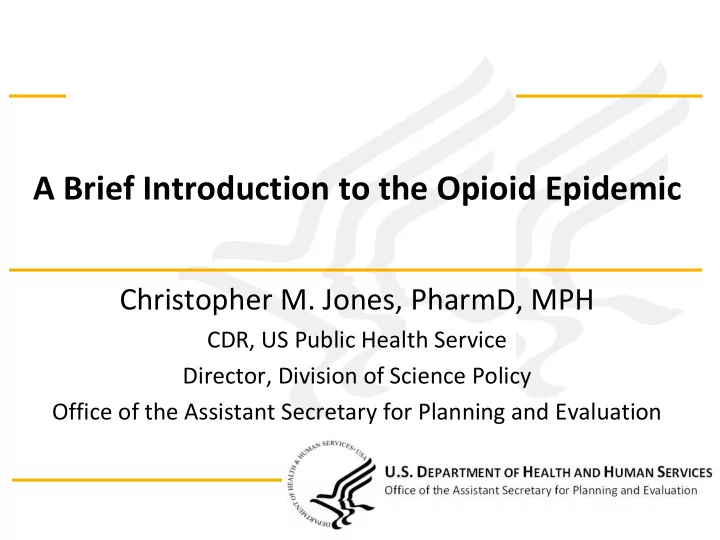

A Brief Introduction to the Opioid Epidemic Christopher M. Jones, PharmD, MPH CDR, US Public Health Service Director, Division of Science Policy Office of the Assistant Secretary for Planning and Evaluation
Overview • Epidemiology crash course • Policy and information sharing
Age-adjusted death rates for Motor Vehicle Traffic and Drug Poisoning, United States,1980-2014 MV Traffic Drug Poisoning 25 Deaths per 100,000 population 20 15 10 5 0 1980 1985 1990 1995 2000 2005 2010 2014 Source: CDC/NCHS, National Vital Statistics System, Mortality File.
2002 Source: CDC, NVSS, Slide courtesy of M. Warner, CDC/NCHS
2003 Source: CDC, NVSS, Slide courtesy of M. Warner, CDC/NCHS
2004 Source: CDC, NVSS, Slide courtesy of M. Warner, CDC/NCHS
2005 Source: CDC, NVSS, Slide courtesy of M. Warner, CDC/NCHS
2006 Source: CDC, NVSS, Slide courtesy of M. Warner, CDC/NCHS
2007 Source: CDC, NVSS, Slide courtesy of M. Warner, CDC/NCHS
2008 Source: CDC, NVSS, Slide courtesy of M. Warner, CDC/NCHS
2009 Source: CDC, NVSS, Slide courtesy of M. Warner, CDC/NCHS
2010 Source: CDC, NVSS, Slide courtesy of M. Warner, CDC/NCHS
2011 Source: CDC, NVSS, Slide courtesy of M. Warner, CDC/NCHS
2012 Source: CDC, NVSS, Slide courtesy of M. Warner, CDC/NCHS
2013 Source: CDC, NVSS, Slide courtesy of M. Warner, CDC/NCHS
2002 2002 2013 2013 Source: CDC, NVSS, Slide courtesy of M. Warner, CDC/NCHS
Rx opioids mostly commonly abused prescription drug, US, 2014 Initiation Dependence or Abuse Past Month Nonmedical Use 5,000 4,500 Number of people reporting behavior (in thousands) 4,000 3,500 3,000 2,500 2,000 1,500 1,000 500 0 Rx Opioids Tranquilizers Stimulants Sedatives Source: SAMHSA National Survey on Drug Use and Health, 2014
Past year opioid use disorders, US, 2003-2014 Any Opioid Use Disorder Prescription Opioid Use Disorder Heroin Use Disorder 2,500,000 2,000,000 1,500,000 Number of Individuals 1,000,000 500,000 0 2003 2004 2005 2006 2007 2008 2009 2010 2011 2012 2013 2014 18 Source: SAMHSA, NSDUH 2003-2014 PUF
Opioid-related overdose deaths, US, 1999-2014 All Opioids Heroin Natural/Semi-Sythetic Opioids Methadone Synthetic Opioids 10 9 8 Age Adjusted-Rate per 100,000 population 7 6 5 4 3 2 1 0 1999 2000 2001 2002 2003 2004 2005 2006 2007 2008 2009 2010 2011 2012 2013 2014
Increases in Rx opioid prescribing coincide with increases in Rx opioid overdose deaths 8 KG of morphine milligram equivalent per 10,000 population 7 6 5 Rate Opioid overdose deaths per 100,000 population 4 3 2 1 0 1999 2000 2001 2002 2003 2004 2005 2006 2007 2008 2009 2010 2011 2012 2013 Source: CDC/NVSS and DEA ARCOS.
Primary care physician’s views on Rx opioids Magnitude of Rx abuse in community Opioids overused for pain 60 60 50 50 40 40 Percent Percent 30 30 20 20 10 10 0 0 No problem at Small problem Moderate Big problem Strongly Somewhat Somewhat Strongly agree all problem disagree disagree agree Confidence in clinical skills related to opioid Comfort in prescribing opioids for chronic prescribing noncancer pain 60 60 50 50 Percent Percent 40 40 30 30 20 20 10 10 0 0 Not at all Slightly Moderately Very Not at all Slightly Moderately Very Source: Hwang et al. Prescription drug abuse: a national survey of primary care physicians. JAMA 2015
Increase in opioid prescribing dose for same conditions over time Source: Wunsch et al. JAMA 2016
Changing demographics of heroin use Source: Jones CM et al. MMWR 2016; Cicero et al JAMA Psychiatry 2014.
Multiple facets of the opioid epidemic
Risk factors for Rx opioid abuse and overdose Demographics Socioeconomics and Geography ▪ Men ▪ 35-54 year olds (deaths) ▪ Medicaid, uninsured ▪ 18-35 (abuse) ▪ Rural ▪ Whites Clinical Characteristics ▪ American Indians/Alaska ▪ Chronic pain Natives ▪ Substance abuse ▪ Mental health ▪ Nonmedical use ▪ Multiple prescriptions ▪ Multiple prescribers ▪ High daily dosage ▪ Combination of opioids and benzodiazepines
Use data to identify patients in need of treatment and improve continuity of information across information systems • PDMPs – Key piece of information in the clinical work flow – Starting point for a conversation with patients • EHRs – Like PDMPs, could provide full visibility on prior drug and treatment exposure, clinical conditions, risk factors – Clinical decision support can facilitate screening, assessment, intervention, and monitoring – Incorporate guidelines on appropriate prescribing for both acute and chronic pain conditions • Insurer/PBM data/Claims data – Examine utilization patterns to identify patients at risk or abusing substances – Academic detailing, alerts to providers, alters to patients, connection with employee assistance programs, etc. • Connection with other information systems such as human and social services, inpatient systems, etc., is needed
HHS Opioid Initiative • Launched by Secretary Burwell in March 2015 • Three focus areas – Improve opioid prescribing – Increase use of naloxone to reverse opioid overdose – Expand use of Medication- Assisted Treatment (MAT) for opioid use disorders
THANK YOU QUESTIONS? CHRISTOPHER.JONES@HHS.GOV
Recommend
More recommend